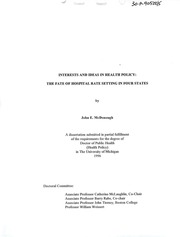Table Of ContentINTERESTSANDIDEASINHEALTHPOLICY:
THEFATEOFHOSPITALRATESETTINGINFOURSTATES
by
JohnE.McDonough
Adissertationsubmittedinpartialfulfillment
oftherequirementsforthedegreeof
DoctorofPublicHealth
(HealthPolicy)
inTheUniversityofMichigan
1996
DoctoralCommittee:
AssociateProfessorCatherineMcLaughlin,Co-Chair
AssociateProfessorBarryRabe,Co-chair
AssociateProfessorJohnTierney,BostonCollege
ProfessorWilliamWeissert
3o f- 90S22/s
ABSTRACT
INTERESTSANDIDEASINHEALTHPOLICY:
THEFATEOFHOSPITALRATESETTINGINFOURSTATES
by
JohnEdwardMcDonough
Co-Chairs:CatherineMcLaughlin,BarryRabe
Fromitsoncepre-eminentpositioninstatehealthpolicy,hospitalratesettinghas
declinedinusetoahandfulofstatestoday. Thisstudyexaminesprospectivehospitalrate
settinginfourstatesthatestablishedaggressiveprograms. Thedecisionstoderegulateby
MassachusettsandNewJerseystategovernments,alongwithananticipateddecisionin
NewYorkin1996,areexamined. Marylandstategovernment'schoicenottoderegulate
isalsoexplored. Tworivaltheoriesareusedaspotentialexplainersofthese
developments:thetheoryofeconomicregulationemphasizingtheroleofinterestgroups,
andthepunctuatedequihbriummodelofpolicychangeemphasizingpolicyideas.
Results:Hypothesesofthetheoryofeconomicregulationarenotsupported.
Whileshiftsininterestgroupsupportforregulationprecededderegulation,clearevidence
thatratesettingbenefitedhospitalsmorethanconsumerswasnotfound;publicofficials,
werenotfoundtoonlyrespondtointerestgroupagendas. Hypothesesofthepunctuated
equihbriummodelaresupported. Identifiable"policyideas"couldbeclearlyassociated
withrateregulationandthemovetoderegulation;clearinstitutionalchangeisassociated
witheachderegulation. Newactorswereidentifiedwhohelpedtounderminetherate
setting"policymonopoly."
Factorsassociatedwithderegulationinclude:1)aconflictwithgrowingmanaged
caresystemsinratesettingstates;2)politicalchangefromDemocratictoRepublican
controlinkeygovernmentalpowercenters; 3)regulatoryfailureandincreasingly
Byzantinereimbursementrulesthatunderminedsupport;and4)changedinterestgroup
supportforderegulation. Maryland'srecordstandsincontrasttothederegulatedstates.
Lessonsfromratesettinginclude:1)deregulationsignifiesanevolutiontomore
advancedformsofprospectivepayment,chieflycapitationinsteadofperdiemorpercase
methods;2)thedeclineindicatesashifttoadifferentroleforstategovernmentinhealth
regulation,includinganexplicitrejectionofthepublicutilitymodel;3)ratesetting's
historydemonstratesthebroadabilityofregulatedentitiestomanipulatereimbursement
systems;and4)theexperienceindicatessomestrengthsinstategovernmenttomaintain
systemstocontrolcostsandimproveaccess.
©JohnE.McDonough 1996
AllRightsReserved
ToHelenandJosephMcDonough
withlove.
ACKNOWLEDGMENTS
Ihadsomeverygoodhelpalongwithwaywiththisdissertation. Majorthanksgoto
myDissertationCommitteeCo-chairs,CatherineMcLaughlinandBarryRabeoftheUniversity
ofMichiganSchoolofPublicHealthwhohavebeenmostpatientandsupportive. Special
thankstoWilliamWeissertwhointroducedmetothepunctuatedequilibriummodelandhelped
toshapethestructureofthisstudy. ThanksalsotoJohnTierneyofBostonCollege,who
introducedmetogreatpoliticalmodelsandideasandwonthestrongallegianceofmy
classmatesforhisintelligenceandapproachtopolitics.
Specialthanksgotothe60interviewsubjectsinMaryland,Massachusetts,NewJersey
andNewYork, Whethertheyknewmebeforehandornot,theyopeneduptheirthoughtsto
meinwaysthatInevercouldhavepredictedbeforehand—andtheirmarvelouslycandid
quotesthatIhaveusedliberallythroughoutthisstudyaretheproofoftheiropenness. The
participantsarelistedinthestudy'sappendix.
Thanksalsotofunderswhogamemetheresourcestocompletethisstudyinsucha
rapidperiodoftime. TheseincludetheHealthCareFinancingAdministrationoftheU.S.
DepartmentofHealthandHumanServices,andtheMichiganBlueCrossandBlueShield
Foundation. Theirsupportwasinvaluableinenablingmetocompletetheinterviewsquickly,
allofwhichweredoneinpersonbytheauthorinthesubject'sstate. ThanksalsotothePew
CharitableTrustfortheirsupportofthisdoctoralprogram
Finally,thankstomychildren,DevlinandAmy,whoputupwithintolerableabsences
anddistractionsduring24monthsofcoursework,andduringanother18monthsof
dissertationmadness. I'dliketosaynow,'TmgoingtoDisneyworld",butthatmayjusthave
towaitforanotherre-electioncampaigntogobyfirst.
iii
r^
PREFACE
ProfessorLeonWyszewianskitoldmeearlyinmygraduatestudiesattheUniversityof
MichiganSchoolofPublicHealththatmuchdoctoraleducationconsistsof"gettingthingsour
ofyoursystemthathavebeenhangingaroundtherefortoolong." Welcometomydoctoral
dissertation. Atleasttohispoint,thereshouldbelittledisappointment.
Since1985,1haveservedasastaterepresentativefortheCommonwealthof
Massachusetts,representinginnercityBostonneighborhoods. Byaseriesofcoincidences-
includingsupportingthewinningsideinaSpeaker'sfight--1becameamemberoftheJoint
CommitteeonHealthCarein1985asthesoleBostonrepresentative. AsItoldpeopleatthe
time,IbarelyknewthedifferencethenbetweenMedicareandMedicaid.
IntheCommonwealth'shealthpolicycirclesinthatperiod,keyinterestwasfocusedon
thestrategizingandbattlesrelatedtotheall-payerhospitalrateregulationsystem Ifyouwere
connectedtoahospital,youwantedmaximumflexibilitytoincreasechargestosustainyour
institution. Ifyouwereassociatedwithinsurers,laborunions,orthebusinessgroupsthat
involvedthemselveswiththeissue,youwantedtokeepthepressureatthemaximumpossible
leveltolowercostsinthemostexpensivehospitalsystemintheworld. Ifyouwerea
consumeroraprogressivelegislator,youwantedtokeeycostsdowntoexpandaccess,andt«
laythegroundworkforfuturebattlesforuniversalcoverage.
Forsixyears,Iengrossedmyselfinlearningtheinsandoutsofanimpossiblycomplex
regulatorymodel,tryingtorationalizeitandmakeitwork,tryingtoholdontoaroadmapof
thepromisedtoleadusalltoauniversalentitlementtocareforallMassachusettsresidents.In
1991,itallfellapart. First,anewlyelectedGovernorsetadirectionformarketorientedhealth
economics. Then,someofthekeyinterestgroupsthathadsustainedtheregulatorysystemfor
iv
solongbegantomoveawayfromtheirpriorpositionsofsupport. Finally,theHouseand
Senaterejectedmyargumentsinfavorofeitheranalternativeregulatorymodel(Maryland's)
orasinglepayeralternative,andembracedthelogicofderegulationandthemarket. Atthat
time,weweretheonly oneofthefourmajorratesettingstatesthatmovedinthisdirection,
thoughNewJerseyfollowedinthenextyear.
Before,during,andafterthatlegislativeconflict,thecuriousinterplaybetweeninterest
groupagendasandpolicyideashadfascinatedandperplexedme. IrecallreadingFeldstein's
ThePoliticsofHealthLegislationin1990or1991andbecomingthoroughlyconvincedofhis
argumentthattheselfinterestmodelcouldexplainnearlyeverythingwhilethepublicinterest
modelwaspracticallyuseless. InthecontextoftheStateHouse,interestgroupsandlobbyists
wereeverywhereandtheirinfluenceseemedboundless. Bycontrast,thehealthservices
researchers,whomIhadbeguntomeetthroughtheNationalCenterforHealthServices
Researchstartingin1985,werenowhere. Theirresearchseemtobenoticedandembraced
onlywhenitconcurredwithbeliefsalreadyheld,andignoredandscornedintheopposite
instances.
InthecourseofmydoctoralstudiesattheUniversityofMichigan,Iexploredmany
ideasandopportunitiesforresearchbeforewindingmywaybacktotheissuesandthemesthat
havebeenwithmethroughoutmylegislativecareer. Theprocesshasledmetofindingsand
conclusionsthataredifferentthanthosethatIheldwhenIfirstshowedupattheSchoolof
PublicHealthinAnnArborinSeptember,1992.
Inbrief,someoftheworstpredictionsabouttheeffectsofderegulationneveroccurred,
andsomeofthepositivepredictionshavecometopass. Wehaveseenconsiderablereshaping
ofthehospitalsector,butwithoutthemassiveclosingsthatwerepredicted. Costsarestill
high,butnotashighastheywereattheendofregulation. Hospitalshaveshiftedtheirfocus
fromgamingstategovernmenttodeterminingtheirownfatesbasedontheirabilitytosurvive
inafastchangingandmercilessmarket. Accesshasworsenedconsiderably,butnot
v
necessarilybecauseofthemovetoderegulation. Overall,whatIfoughtsohardagainsthas
beenamixedblessing,butonbalance,abenefit.
Meanwhile,interestsdonotappearquiteasfearsomeastheydidinpriordays. Tobe
sure,theyarenottobeignored,provoked,ormessedwithunnecessarily~whenstrong
groupsarestronglyunited,theycanstillkillalmostanythingintheirpaths,astheyrecentlydid
tomylatestproposalforaminimalhealthcareemployermandate. Buttheycanalsobe
understood,workedwith,andhelpedinwaysthatmakerealprogresspossible. Most
importantly,whenpolicyideasareonthetableincompellingandimmediateways,itisoften
theinterestswhomustlearntoaccommodateandadapt. It'snotjustideasthatmatterin
healthpolicy,butit'snotjustinterestseither.
Thisstudyistheresultofmypilgrim'sprogressingrapplingwiththemeaningofstate
rateregulation'sdemise,andwiththeeternalinterplaybetweeninterestsandideas,centeredon
thedynamicandhyperactivefieldofhealthcarepolicy.
vi
TABLEOFCONTENTS
DEDICATION U
ACKNOWLEDGMENTS
„ iii
PREFACE
iv
LISTOFTABLES
ix
LISTOFFIGURES
xi
LISTOFAPPENDICES
xii
CHAPTER
L INTERESTSANDIDEASINHEALTHPOLICY:ANOVERVIEW
OFTHE STUDY
1
GeneralStatementofObjectives 3
SpecificAims/TheoreticalModels 4
OrganizationoftheStudy 9
Applied/PolicySignificance 10
H. LITERATUREOVERVIEW 15
ABriefHistoryofRateSetting 15
AReviewofRateSetting'sPerformance 18
ParadigmShift:FromRegulationtoCompetition 25
TheoreticalFrameworks 28
HI. RESEARCHMETHODOLOGY 53
TheoreticalPropositions 54
ResearchDesign/ModelSpecification 58
DataSourcesandCollectionProtocol 60
AnalysisStrategy 62
ValidityandReliability 63
FinalReport 64
rV. THEBACKGROUNDANDCONTEXTOFTHESTATES 67
PriorResearchonRateSettingintheSubject 68
vii

